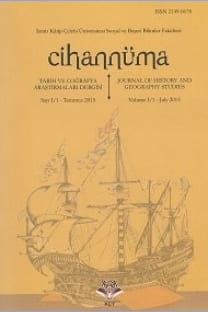Düşman Casusları, Fahişeler ve Osmanlı Hafiyeleri Üçgeninde Beyoğlu'nda Bir Alman ve Birahanesi (1916-1918)
Bu çalışmaya konu olan olay örgüsü I. Dünya Savaşı’nın devam ettiği günlerde İsviçre’nin (de facto) başşehri Bern’de bulunan Osmanlı elçiliğinden İstanbul’a ulaşan bir istihbaratla başlamıştır. İstihbaratın içeriğinde İsviçre’de Osmanlı aleyhine faaliyet gösteren casuslarla ilgili oldukça enteresan haberlere yer verilmiştir. Bahsedilen casuslar genellikle Rum’dular. İsviçre’de tedavi bahanesiyle bulunmakta, gerçekte ise Babıâli’nin düşmanlarına casusluk etmekteydiler. Kendilerine Osmanlı’nın durumuyla ilgili bilgileri aktaranlar ise İstanbul’daki bazı fahişe ve fuhuş evi işleticileriyle onlara yakın olan kimselerdi. İstanbul ve Bern arasındaki istihbarî bilgi akışını sağlıklı ve güvenli bir şekilde yürütmek için de kendilerince bir sistem geliştirmişlerdi. Bern Osmanlı elçisi bahsedilen casusluk şebekesinde yer aldıkları iddia edilen şahıslarla ilgili olarak kendilerine ulaşan ihbarlardan hareketle bir liste hazırlayıp Hariciye Nezareti’ne göndermişti. Karl Kusch isimli bir Alman da o listeye dâhil edilmişti. Onun hakkında Osmanlı karar alıcıları tarafından evvela bir sürgün kararı çıkarıldı. Ancak müttefik Almanya’nın vatandaşı olduğu için sürgün kararı, sınır dışı edilmesi yönünde değiştirildi. Kararın uygulama sahasına aktarımına geçildi. Gerekli işlemler tamamlandıktan sonra geriye sadece bir adım kalmıştı. İstanbul’daki Alman elçiliği tarafından ilgili şahsın pasaportunun vize edilmesi gerekiyordu. Bunun için Osmanlı makamları tarafından Alman diplomatlarına bir bilgilendirme ve başvuru yapıldı. Ancak elçilikten alınan cevapla birlikte müttefik imparatorlukların temsilcileri arasında beklenmedik ve hayli uzun bir tartışma başladı. O sürece ilişkin olarak Osmanlı arşivinde rast gelinen belgeler serisi takip, tahlil ve terkip edildiğinde bu çalışma ortaya çıktı. Çalışma içerisinde taraflar arasında karşılıklı bir güvensizlik olduğunu hissettirir bazı ifade ve gelişmelere rastlanmıştır. Ayrıca Osmanlı başkentinin daima en işlek uluslararası mekânlarından birisi olan Beyoğlu’nun I. Dünya Savaşı günlerinde nasıl bir fuhuş ve birahaneler ağıyla çepeçevre kuşatıldığı görülecektir. Son olarak düşman casuslarının varlığına ilişkin alınan küçük bir duyum ve ihbarla onlardan doğan bir şüphenin Osmanlı diplomasi ve bürokrasi ağında meydana getirdiği hareketlilik ve hassasiyet de çalışma süresince tanıklık edilecek gelişmelerden birisi olmuştur.
A German and His Brasserie in Beyoğlu within the Triangle of Enemy Spies, Prostitutes and Ottoman Sleuths (1916-1918)
The plot, which was the subject of this study, started with the intelligence that reached the Istanbul from the Ottoman embassy in Bern, the de facto capital of Switzerland on the days of World War I. In the content of intelligence, there are some interesting news about the spies operating against the Ottoman in Switzerland. The spies were usually Greeks. In Switzerland, under the pretext of medical treatment, in fact, they were spying for the enemies of the Sublime Porte. People who transferred information about the state of the Ottomans to them were some of the prostitutes and prostitution house operators in Istanbul and those close to them. They also developed a system for carrying out the information flow between Istanbul and Bern in a healthy and safe manner. The Ottoman ambassador to Bern had prepared a list and sent it to the Ministry of Foreign Affairs on the basis of the notifications that had been received in connection with the alleged involvement in the spying network. A German named Karl Kusch was also included in the list. An expulsion order was issued by the Ottoman decision-makers. However, as the ally was a citizen of Germany, the decision to exile was changed to deportation and began to be implemented. After the necessary procedures were completed, there was only one step left. The German embassy in Istanbul had to issue a visa for the person concerned. For this purpose, an application was filed by the Ottoman authorities to German diplomats. However, the response from the embassy and the representatives of the allied empires triggered an unexpected and quite long debate. This study dwells upon the document series in the Ottoman archives prepared in this process. There are some expressions and developments revealing that there was a mutual distrust between the parties. In addition, Beyoğlu, one of the busiest international venues of the Ottoman capital, is seen in the war days within the context of a network of prostitution and breweries. Finally, the study deals with the mobility and sensitivity of the Ottoman diplomacy and bureaucracy network instigated by a small speculation about the existence of enemy spies, and a suspicion about them.
Keywords:
Karl Kusch, Ottoman Empire, Germany, spy Beyoglu,
___
- Acar, Kezban, “Osmanlı Devleti’nin Son Yüzyılında Fuhşu Önleme Çabalarına Dair Bazı Tespitler (1810’lar-1910’lar)”, History Studies, c. 10, S. 9, 2018, ss. 1-19.
- Alkan, M. Nail, “Hayranlık, Dostluk ve Çıkar Üçgeninde Türk-Alman İlişkileri”, SDÜ Fen Edebiyat Fakültesi, S. 34, Nisan 2015, ss. 35-48.
- ISSN: 2149-0678
- Yayın Aralığı: Yılda 2 Sayı
- Başlangıç: 2015
- Yayıncı: İzmir Katip Çelebi Üniversitesi
Sayıdaki Diğer Makaleler
Şam Hazinesi'nin H. 1152 (M. 1739-40) Tarihli Muhasebe İcmali
Demokrasiye Geçiş ve Ordu: İspanya ve Türkiye Karşılaştırması
Tanzimat’tan II. Meşrutiyet’e (1839-1908) Esnaf Hareketliliği, Devlet Kontrolü ve İstanbul
Dilekçeciler Olarak İşçiler: İranlı İşçilerin Söylemler Pratikleri, 1906-1941
Babil Felsefesi Üzerine Tezler
Osmanlı Dönemi'nde Saraybosna Yangınları (1697-1878)
Kırım Tereke Defterleri Üzerine Mülahazalar
Moğolistan’da Bulunan Ulaan Khermiin Shoroon Bumbagar (Mayhan Uul) ve Shoroon Dov Kurganları Üzerine
